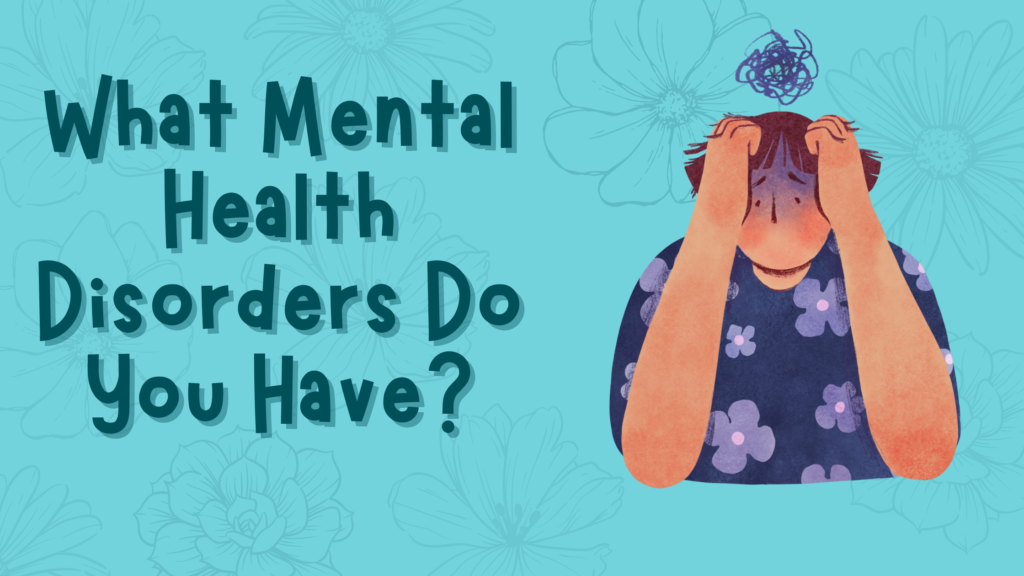What Mental Health Disorder do you have?
Nowadays, in the world that is so fast-paced, mental health disorder is being talked about more and more. Nowadays, from the celebrities revealing their problems to the social media influencers endorsing the self-care tips, it seems like everyone is talking about the mental well-being. But amidst all the chatter, have you ever stopped to wonder: Which mental health disorder are you suffering from?
The recognition and comprehension of the mental health disorders is the first and most important step toward the promotion of the total well-being and the obtaining of the right support. Tt is necessary to meet with a mental health expert for a proper diagnosis. There are some general signs and symptoms that can provide clues regarding the possible mental health problems.
Most common mental health conditions
Anxiety Disorders
Anxiety disorders are the most common mental health conditions, characterized by excessive worrying, fear, and nervousness. Symptoms may include:
The same way that a person experiences continuous anxiety about the ordinary things of life or the activities they engage in.
Being listless or edgy is when you are uncomfortable and upset.
Difficulty concentrating or focusing
Physical manifestations like sweating, shaking, or a quick heartbeat are the signs of the extent of your fear.
The whole situation feels like you are burning out, exhausting yourself, and always feeling kind of nervous. So, if you see yourself in this situation you may be suffering from an anxiety disorder.
Depressive Disorders
Depressive disorders like major depressive disorder and persistent depressive disorder. They have the same symptoms, which will be persistent, sad, hopeless and loss of interest in activities. Symptoms may include:
Lasting pain or negative attitude are those features that we will call persistent sadness
The loss of interest or enjoyment in previously liked activities has decreased motivation to go to school and try new things in the future.
Changes in eating habits or weight are presented as the consequence of action carried out by the system.
Negative feelings or exhaustion are the result of a decrease in the drive or motivation.
Deaths and suicides were the concerns in my mind.
If you are having days when you are sad or there is no meaning in your life which interferes with your daily activities, you may be suffering from depression.
Bipolar Disorder
Bipolar disorder is the illness which is characterized by the extreme mood swings. This can be the from the highs of manic to the lows of depression. Symptoms may include:
The periods of the exceptional energy and high spirits (mania) are the factors.
It is the moments when you feel so sad and hopeless (depression) that are shown in this topic.
Changes in sleep patterns
Impulsiveness or recklessness during the manic phases are the main challenges of this disorder.
If you go through very harsh fluctuations in mood and energy levels, then you might be the person who is suffering from bipolar disorder.
Obsessive-Compulsive Disorder (OCD)
OCD is a disorder that comprises of intrusive thoughts or obsessions with a group of repetitive behaviors or compulsions. Symptoms may include:
The constant, forced thoughts or images are the same as having made a decision to become a permanent thought.
The activities or the compulsions that are done out of ritual or to reduce the anxiety are called the ritualistic behaviors.
Problem with the ability to manage or to overcome the obsessions and compulsions is the level of the difficulty for the person.
Social or work issues affects the way of life.
If you are in a situation where you are constantly thinking about and doing the same things repeatedly, you may be having OCD.
Post-Traumatic Stress Disorder (PTSD)
PTSD can develop after experiencing or witnessing a traumatic event, leading to symptoms such as:
PTSD can develop after experiencing or witnessing a traumatic event, leading to symptoms like mentioned below
Involuntary thoughts or head-on flashes of the awful incident are the complete intrusion memories or flashbacks of the terrifying event.
You should not be in touch with reminders or triggers related to the trauma. Contrast with the fact that negative changes in mood or cognition can be present in other personality disorders.
The term Hypervigilance or Exaggerated Startle Response is used for the condition where a person has an abnormal reaction to a situation. They behave as if the situation will be worse and dangerous.
If you suffered a traumatic event and still feel distressed about it, there is a high chance that you are suffering from PTSD.
Conclusion

These are the common mental health disorders. Tt is important to note that mental health is intricate and specific individual cases may differ. If you find yourself among those who have any of these indications or symptoms, it is of utmost importance to go to a professional in the mental health field for help.
Keep in mind, you should not be ashamed to ask for help in your mental health. Either it’s by going to therapy, taking medicine, or through the self-care practices, taking the first step to prioritize your well-being is a brave and audacious move.
If you are not sure of your mental health status, there are many internet resources and self-assessment tools. This tools can be used to have a better idea of your symptoms. Tt’s very important to use these tools as a means to begin the evaluation and treatment process. To sum it up, the recognition and the diagnosis of mental health disorder is a necessary step in the promotion of general well-being. You can notice the signs and symptoms of common mental health issues. Thus by doing this you can take the necessary steps to improve your mental health and thus have a much better life. Do not ever forget that you are not alone, and help is always around you.



Recent Comments